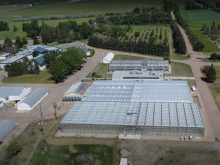University of Saskatchewan professor tries to explain economic benefits of technology on food production, safety and trade
Stuart Smyth wears a few hats: university professor, researcher and, most recently, blogger.
Smyth has launched a website, saifood.ca, in which he tackles hot button issues in the agriculture sector. Think genetically modified flax, rising chemical use on prairie farms and new crop trait approvals.
A recent post about A & W’s “better beef” campaign, which promotes products that contain no added hormones or steroids, quickly drew 12,000 views. The headline read: How A&W supports unsustainable agriculture.
Read Also

Alberta crop diversification centres receive funding
$5.2 million of provincial funding pumped into crop diversity research centres
“The idea behind the blog was to try and do a better job of unpacking some of technical things we write about at an academic level that we’ll share amongst academics or with colleagues in government or industry and try and take the technical aspect out of the story and then reproduce the story in a writing style that the average person who gets emailed this can really understand in two or three minutes of reading,” said Smyth, a professor at the University of Saskatchewan’s bioresource policy, business and economics department.
Smyth’s research addresses new technologies in agriculture and their impact on crop production, food safety, product approvals and international trade.
It’s this policy work that attracted the interest of agriculture’s private sector, which began funding a research chair at the university helmed by Smyth.
The five-year program is supported by Bayer CropScience, CropLife Canada, Monsanto, Syngenta and the Saskatchewan Canola Development Commission.
He said it’s the first industry funded research position in a social science at a Canadian university.
“What we want to try and do is generate some economic and environment numbers that the agriculture industry as a whole, not just the companies that I work for … can take and say, ‘here is the benefit of investing in commodity agriculture. We can contribute to global food security by doing these things,’ ” said Smyth.
“Right now, the regulation around crop technologies is becoming a bottleneck in the innovation system. We do a really great job of basic (research and development) in Canada. We do a fantastic job of getting the science and the agronomic aspects of new crop varieties developed and submitted to our regulators, but the regulatory portion of an innovation is increasing in time and as a percentage of the overall amount of time it takes a product to go from initial genomic concept through to being available for anybody to plant and consume.”
Among the projects Smyth’s team will take on is a continuation of farm survey work Smyth first conducted in 2006. At the time, genetically modified, herbicide tolerant canola had been in Canadian fields for a decade, bringing more acres out of summerfallow and increasing crop production.
His research found that most farmers growing herbicide tolerant canola reported reduced soil erosion and increased moisture conservation from no-till practices.
Smyth will begin a new survey later this year that will also include corn and soybean growers in Ontario and Quebec and questions about weed resistance associated with increased use of herbicides, such as glyphosate.
“One of the things that we did not do a good job on was capturing the greenhouse gas emissions and also the carbon offsets,” he said.
“We think that there’s a substantial story to be told in terms of how farmers are contributing to reducing carbon emissions.”
Other projects will assess global regulations and trade barriers and the rising influence of “socio-economic considerations” from concerned consumers.
“You certainly see that within the European system because in terms of biotechnology, they’ve allowed the approval of one new variety in a decade because they’re so hung up on consumer acceptance that they’ve got regulatory gridlock. They can’t approve anything in Europe,” said Smyth.
“Integrating consumer acceptance into a regulatory system is not where we want to move the Canadian system. We want to stay anchored in that science-based (system) because it’s tried, it’s true. We have not commercialized a product that I can think of that’s caused a problem in the food sector.”
Contact dan.yates@producer.com















